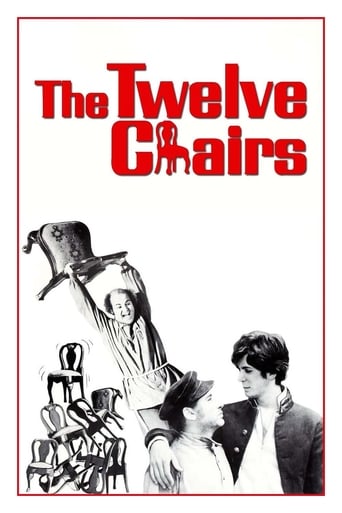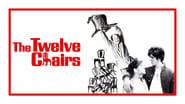Claudio Carvalho
The Twelve Chairs Years after the Russian Revolution in 1917, the former aristocrat Ippolit Matveevich Vorobyaninov (Ron Moody) is informed by his terminal mother-in- law that she has hidden her jewels in a the upholstery of chair from a set of twelve chairs. The Orthodox Father Fyodor (Dom DeLuise) also hears and leaves the Church to seek out the treasure. Vorobyaninov travels to his old house and meets his former servant Tikon (Mel Brooks) that adores him. He learns that the chairs had been expropriated by the new government and sent to another place. However the con artist Ostap Bender (Frank Langella) convinces Vorobyaninov to be his partner. They travel to Moscow where Ostap succeeds in luring Father Fyodor, telling that the chairs belong to the Engineer Bruns (David Lander), who has very similar chairs and lives with his wife in Siberia. Will Vorobyaninov and Ostap find the twelve chairs?"The Twelve Chairs" is a typical Mel Brooks' comedy with the usual type of humor with a satire to the Russian Revolution. This comedy is also the debut of Frank Langella in the cinema. Fans of Mel Brooks will certainly like it, but who is not his fan may not find this comedy entertaining. My vote is six.Title (Brazil): "Banzé na Rússia" ("Mess in Russia")
highwaytourist
I saw this years ago and it was painfully unfunny. I showed it to some friends because Brooks is usually funny and I wound up being embarrassed. I barely remember what it was about, but what stuck in my mind was that it was laugh free. It has something to do with three losers during the 1920's in Russia looking for some jewels that are hidden in the chairs of a deceased aristocrat They go through various ordeals and at times bored me to tears. Brooks here shows none of the talent he would later display in films like "Blazing Saddles" or "Young Frankenstein." I really hated this film and can't imagine what parts anyone laughed at.
MartinHafer
A week ago, I saw the Cuban version of "The Twelve Chairs" and assumed it was the first version of the famous Ilf and Petrov novel. However, I researched a bit and found that there are at least two other versions out there--and possible more. In the 1930s, there was a Czechoslovakian filming of the story (the first) and then a British version as well. I also learned that all of these versions are different and not so bleak as the original story--a story where one of the partners in crime KILLS the other--only to learn that the jewels are not in any of the chairs. I could see how this version would be better for Soviet propaganda--but funny, no way. So the movie versions apparently have a more innocent and funnier slant--a good idea if you ask me.This Mel Brooks version is quite different from the Cuban one--much more slapstick, more cinematic and possessing much more energy. In fact, the lack of energy was my biggest complaint about the Cuban film. For a comedy, it was just too retrained. Here in the 1970 version, however, the opposite is true--at times the story has a bit too much energy and relies a bit too much on slapstick. For example, during a few scenes Brooks does something I HATE--speeds up the camera to indicate it's a funny scene. However, if it's funny, let it be funny on its own merit--don't do cheap camera tricks. Also, while adding a new character to the story was not necessarily a bad idea, Dom DeLuise's priest was, at times, over the top and didn't fit with the mood set by the rest of the film. Eliminating the camera tricks and keeping DeLuise under control would have improved the film immensely. Also, keeping Brooks out of the film completely wouldn't have hurt, either. I loved his writing and directing, but his best films had him barely in them (such as "The Producers" and "Young Frankenstein").Now I have criticized the film quite a bit--but there is a lot to like and I think it's one of Brooks' better films. The most obvious plus in the film was the wild and crazy performance by Ron Moody. Because Moody had many quiet and restrained moments, his crazy scenes worked well. For example, while a generally restrained man, seeing him, out of the blue, climb up the pole to the high wire was hilarious. And, a few other times when he lost control, couldn't help but smile. RESTRAINT and selective craziness was what made him a joy to watch.I also respected the nice location shoot in Yugoslavia. It could have been made in the States but filming in a locale more like the USSR helped--and there was no way the Soviet Union would have allowed the film to be made there considering the state of US-USSR relations at the time. The color cinematography and locations shoots were nice.I was surprised, but Brooks' song "Hope For The Best, Expect The Worst" was also a wonderful song. It was catchy, summed up the film well and I found myself humming it after the movie was over.Finally, I liked the relationship between Moody and Frank Langella--particularly at the end of the movie. Going for a sentimental ending with some pathos was a great idea--and ending it like the novel would have been just awful.Overall, while I am sure many would disagree, I think that apart from "The Producers" and "Young Frankenstein" this was Brooks' best film. There is a likability and subtle (at times) that you just never see in his later films...and I like this and find it endearing. Too bad his films became progressively goofier and self-indulgent.
getlance-1
Ron Moody and Frank Langella are wonderful as the beggar duo and have some tender moments - especially for a Mel Brooks movie. I find their casting perfect and think that they work very well together. Dom DeLuise steals the show, however, as the greedy defrocked priest. His slapstick comedy relief contrasts nicely the more philosophical nature of the film.Granted, it's not true to the original book, but remember that this is a Mel Brook's film! It's a little dated now days, but still worth seeing. It's still the only time that I've ever fallen out of my seat in uncontrollable laughter at a movie theater. Watch out for Dom DeLuise going up a really big hill!




